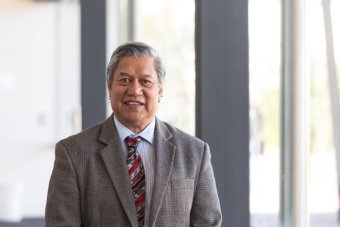quHealth researchers have launched a new education kit in the hope that it will start a conversation amongst Indigenous men about prostate cancer and erectile dysfunction.
Prostate cancer is the most commonly diagnosed cancer in Australia, with nine men dying from the disease every day, but experts say many men do not want to talk about it and some doctors are loathe to ask.
Putting men on the spot is what Perth doctor Mick Adams does best.
The Edith Cowan University health researcher has travelled around Australia asking Indigenous men why they are so reluctant to talk about their health, especially when it comes to erectile dysfunction and prostate issues.
“The interesting thing about it was a lot of men knew what was going on in their bodies, but a lot of them were suffering in silence,” he said.
“I think the medical jargon puts them off because they don’t really understand what’s going on and what’s happening medically.”
‘It’s about starting a conversation’
Dr Adams found just 30 per cent of men surveyed had spoken to their doctor about a prostate test.
“I asked men to fill in a questionnaire and some of them were big macho men, they said ‘I don’t need that, I’m a big stud and I can do it all night’,” he said.
“I said ‘Well, I’ll go talk to your wife about it’.
“The [wife then] turns around and said, ‘Yes give me that questionnaire, I’ll fill it in for him’.
“It’s about starting that conversation and putting blokes on the spot as well.”
Men might not want to talk about their sexual health but Dr Adams, who is a descendent of the Yadhiagana/Wuthuti people of Cape York Peninsula in Queensland, believes many doctors are not asking either.
“Men have to ask doctors the questions as well as doctors asking the questions,” he said.
“[Doctors need to] throw in a phrase like how you going, how’s the old boy, is he getting up, is he getting the job done?
“It’s tongue-in-cheek, but it eases the men into a comfortable position.
“You really got to be mindful about how you approach these issues.
“I find men want to talk about it, but someone has to start the conversation with them.”
Stigma associated with cancer in Indigenous communities
Events like Movember, where men grow moustaches to raise money and awareness, have sparked a national conversation about prostate cancer, but Anthony Owe from the Prostate Cancer Foundation of Australia said many men were still reluctant to talk about it or get tested.
“It’s very important to diagnose prostate cancer early because if its diagnosed before it escapes from the prostate gland it can be treated,” he said.
“If it’s spread, there are treatments that can be done but it can’t be cured, so it’s important to catch it at that stage when it can be cured.”
Mr Lowe said Indigenous men were less likely to be diagnosed with prostate cancer, and when they were diagnosed, mortality rates were significantly higher than non-Indigenous Australians.
The foundation is today releasing a series of flipcharts with information about prostate health, cancer treatment and advice for family.
“We did extensive research and consultation with Indigenous communities and what we learned is that there’s a low level of knowledge of prostate cancer and there are certain stigmas associated with it as well,” Mr Lowe said.
“There’s a sense in Indigenous communities that if you get cancer you are going to die.
“We also learnt the digital rectal examination carries significant stigma in Aboriginal communities particularly, so we really wanted to counter that and get the correct health message out.”
The tool will be used by health groups and doctors to help start the discussion.
Dr Mick Adams, who opened a national men’s health conference in New South Wales this week, said it was long overdue.
“I did a public lecture series two nights ago — there was over 140 people there and the majority were men,” he said.
“I asked who had had a prostate check-up in the last three months and three put up their hand.
“I then asked who had talked to their partners about sexual health and prostate cancer and I think the same three put up their hand.
“What information are they getting? What encouragement are they getting?
“We really need to start looking at ways of getting men to start opening up about it.”

